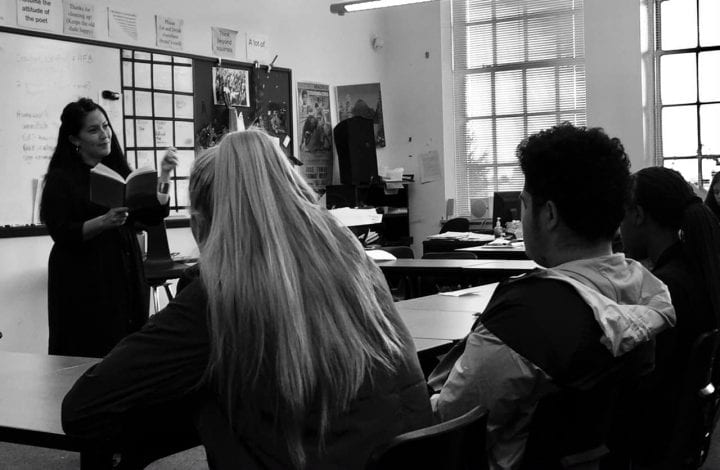
Writing Advice from Ada Limón
October 10, 2016
By Alison Stagner, SAL Events Coordinator & Sonder Editor
When SAL’s luminous 2016/17 Poetry Series opener Ada Limón visited Roosevelt High School last Thursday, there was a surprising moment in the classroom.
Asked about the writing exercises she uses in her own classes, Ada described a technique she ordinarily practices with much younger children: a group effort poem, composed aloud, in which students go around popcorn-style, completing the sentence I love _____________.
“Why don’t we try it?” challenged the English teacher, Tom Nolet.
Despite being designed for eight-year-olds, pretty soon, this exercise had the high school students on fire. As one student after another piped up with their contributions, the entire class went quiet, tuned in to the rhythms of one another’s speech, to the small, unexpected details they managed to stitch into the notion of “love.” It was an exercise that asked students to be vulnerable, spontaneous; and vulnerability must be the origin of creativity and innovation, because even the kids slouched in the back row were smiling and nodding along.
Given a little jolt of inspiration just hearing about this exercise from Alicia Craven, WITS Program Director, I turned to the SAL audio archives to pull more genius advice from Ada Limón’s reading at McCaw Hall on October 5th. Here’s everything she had to say from ending poems, to finding her own voice, to dealing with failure—plus one hard lesson she learned from poet Philip Levine.
On love poems:
“I have been fascinated by the idea of writing love poems for your friends.”
On taking lessons with Philip Levine:
“At one point, I was reading a lot of Kenneth Koch, and I brought in a poem that had really long lines, that wasn’t very narrative at all… It was kind of scattered. Phil was staring at the poem, obviously thinking, What is this? My friend Kazim Ali said, “But Phil, aren’t there some beautiful lines here?” And he responded: “Yeah, there are some beautiful lines, I just wish she had put them in an effing poem.” (He didn’t say “effing,” though. He wasn’t censoring himself.) It really kind of wrecked me for a while, but at the same time, I have always remembered that: even if you’re saying a lovely, lyric sentiment within the middle of a poem, if it’s not building a poem, then it doesn’t matter.”
On failure and rejection:
“Failure is fascinating because that’s the entire process of writing. You’re never living up to the reality of what’s happening in your head.”
“You shouldn’t listen when [critics] tell you the bad things. But you also shouldn’t listen when they tell you the good things. Both of those can wreck your creative process. It still has to be about the attempt.”
On finding her own voice in poetry:
“I compose out loud almost entirely because the sound is really essential for me. When you do that, you get really familiar with your own voice. It’s an easy way to find what is off-kilter or not ringing a true note.”
On endings:
“I’m obsessed with endings. I see a lot of contemporary or younger poets maybe not making choices for endings. They just leave the poem. And I always tell students: it’s like you have us in a room, we’re right there with you, we kind of have a crush on you—and then you just walk away. And there’s a lot of poems that do that, primarily because people are scared to make a choice.”
“I want to be Simone Biles. I just want to stick it. But sometimes, the poem just doesn’t have that. Sometimes, the poem just needs to meander off. So it’s a constant struggle between bowing down to the poem and following my instincts as a writer.”
On permission:
“I feel like so many students sit down to write a poem and say, What’s the worst thing that’s ever happened to me? That’s what I’ll write about because that’s what a poem should be. What’s really hard is to write about joy, happiness, contentment. We don’t have the language for it. So give yourself permission not to write the list of sad things.”
Missed out Ada Limón? Many more fabulous poets are coming in our 16/17 Poetry Series—next up is the Bagley Wright Lectures Series poet, Rachel Zucker, who will be giving a talk on confessional poetry, ethics, and disobedience on November 14th.